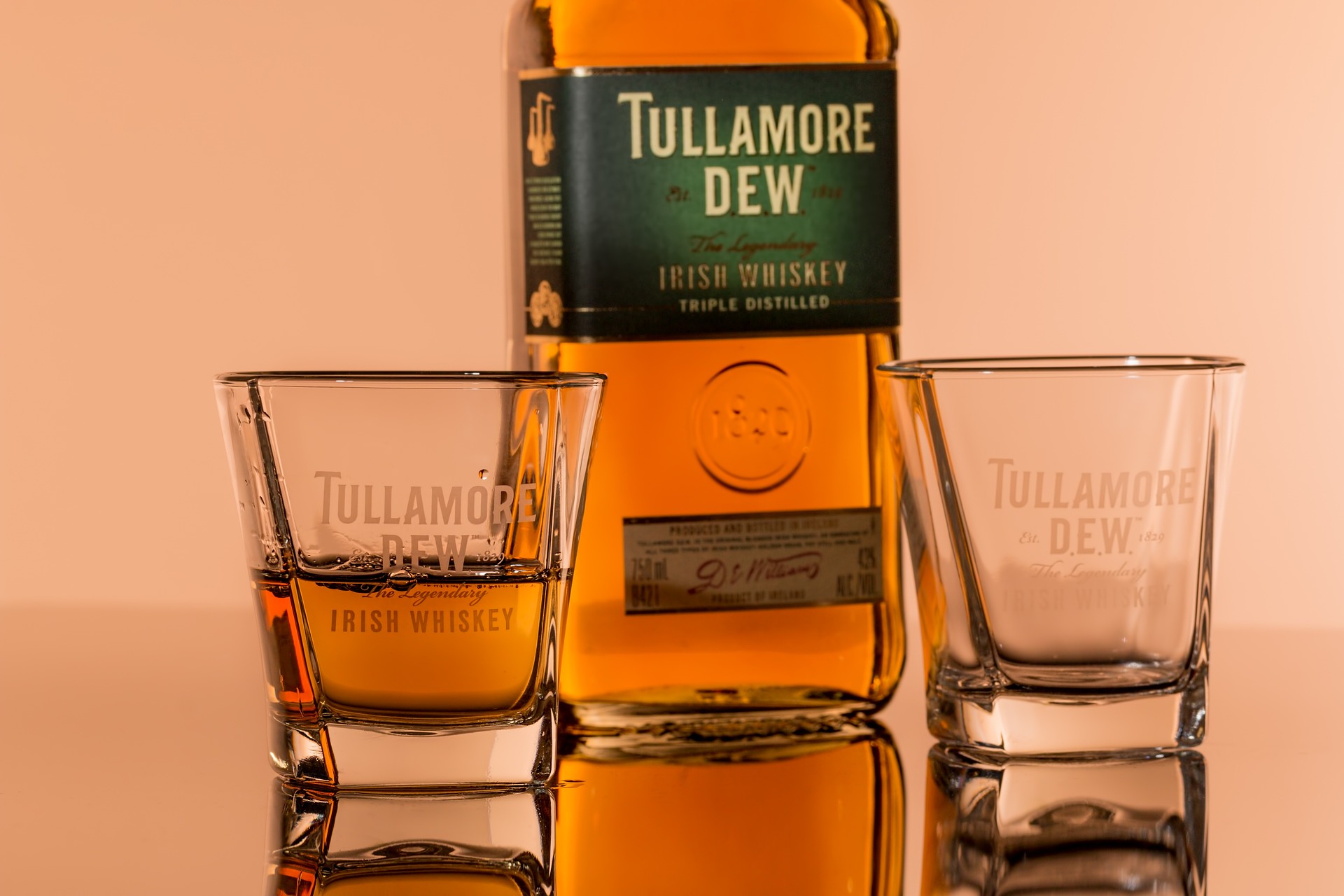Irish whiskey, sometimes known as “Uisce beatha” here on the Emerald Isle (literally meaning “water of life”), is famed globally for its smoothness and triple-distillation method.
It’s crafted exclusively in Ireland and is a beloved tipple in the UK, United States and elsewhere across the globe.
What is Irish Whiskey?
Irish whiskey is a global favourite, with origins in the Irish Whiskey Act of 1950. This legislation dictates that Irish whiskey must be distilled within Ireland from a mash of malt and cereal grains. Additionally, Irish pot still whiskey must be distilled in pot stills within Ireland, using grains typically grown in the country.
Irish whiskey is usually distilled from unmalted barley, but some may also incorporate malted barley. The malt is dried in closed kilns, so it is only exposed to hot air and not smoke. Additional enzymes may be added to the fermentation process to convert starches into alcohol. This whiskey is then typically triple-distilled in copper pot stills, though grain whiskeys may be distilled using continuous column stills.
All Irish whiskeys must be aged for at least three years in barrels by law. The barrels can be new or previously used, and may have been used to store sherry, bourbon, or rum.
The most famous Irish whiskeys, Bushmills and Jamesons, are blended whiskeys that contain grain whiskey after aging. Single malt whiskeys are more likely to be found in the premium range. Irish whiskeys are typically bottled at 40% ABV (80 proof) or higher, with some reaching up to 120 proof.
Nowadays, however, many Irish whiskeys are breaking with traditional production methods, incorporating peat, and various grains, and experimenting with different wood casks.
Types of Irish Whiskey:
- Blended Irish Whiskey
- Single Malt Irish Whiskey
- Single Pot Still Whiskey
- Grain Irish Whiskey
- Single Grain Irish Whiskey
- Potcheen
Cocktails made with Irish Whiskey:
- Irish Slammer
- Massey Cocktail
- Pickleback Shot
- Irish Coffee
- Jameson and Ginger (or Irish Buck)
Irish whiskey can be used in place of Scotch or Bourbon, making it a versatile base for many creations. Its mixability gives rise to many cocktail and shooter recipes that call for its use. Additionally, it can be swapped in for Scotch or Bourbon in many whiskey cocktails.
What is the Difference between Scotch Whisky and Irish Whiskey?
The debate over which style of whiskey came first is centuries old.
Irish whiskey and Scotch whisky both have long and rich histories and have been around for centuries in both nations. While the two styles have customary practices that generally characterise the style, there are whiskeys that borrow practices from the other, which can lead to confusion. The first, and most noticeable difference, is that Irish whiskey is usually spelled with an ‘e’ and Scotch whisky with a ‘y’, although this isn’t always the case.
Irish whiskey is typically triple-distilled, while Scotch is often distilled only twice. There are now peated and double-distilled Irish whiskeys and non-peated and triple-distilled Scotch whiskeys. Both styles include blended and single malt whiskeys, though Scotch is more famous for the latter.
The distinguishing factor between the two is the smokiness of Scotch and the smoothness of Irish whiskey. Both are fermented with barley – Scotch is often malted and Irish whiskey largely unmalted – and the blended whiskey of either may include grain whiskey. Ultimately, the experience of sipping either style of whiskey is unique, and each deserves its own acclaim.
What does Irish Whiskey Taste like?
Irish whiskey is known for its smoothness, but it can also be enjoyed with a hint of spice. It is an excellent spirit to use both in cocktails and for sipping neat or on the rocks. Irish whiskey has a unique flavor that is typically described as light and fruity, with recognizable cereal grain notes. The ageing process lends the whiskey a smoothness and oaky caramel flavor, with some spice.
Popular Irish Whiskey Brands
Ireland was once home to a thriving whiskey distilling industry. However, a series of conflicts, the rise of Prohibition in the United States, followed by the Great Depression and World War Two, caused most of these distilleries to shut down.
Only Midleton in the south and Bushmills in the north remained in operation for many years. Then, in 1987, Cooley was established, and the three distilleries became responsible for producing all Irish whiskey, including their own labels and other brands. Since the beginning of the 21st century, there has been a revival of this sector, and several new distilleries have emerged, offering a wide array of new brands to explore, including:
- Jameson
- Tyrconnell
- Bushmills
- Redbreast
- Connemara
- Green Spot
- Kilbeggan
- Tullamore Dew
Ciaran Keane, Craft Ambassador at the Jameson Distillery in Dublin, explains, “Irish whiskey is so special because of its distinctive taste, which lends itself so well to a multitude of uses. Irish whiskey has the potential to bring something special to every occasion. Its versatility sets it apart from other types of whiskey and makes it an ideal choice for any occasion.”
If you want to find out more about Irish whiskey, and how it’s made click here.
Cheers to that!

